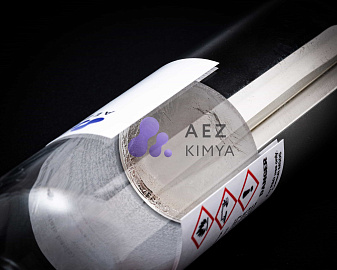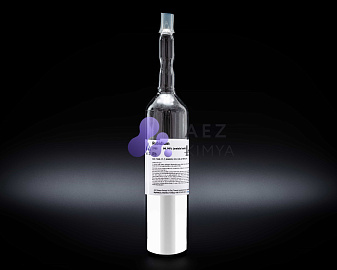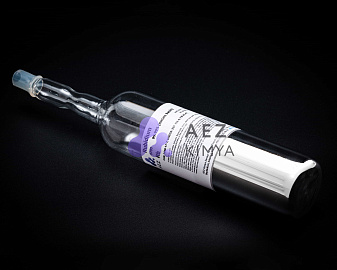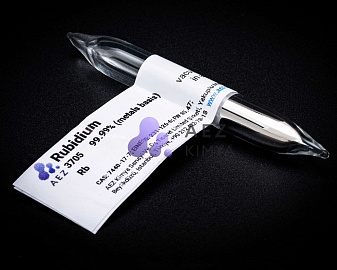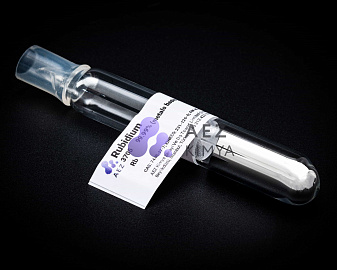Rubidium
99.99% (metals basis)
Rubidium
99.99% (metals basis)
CAS №:
7440-17-7
MDL:
MFCD00134055
EINECS:
231-126-6
PubChem:
-
ID:
3705
Formula:
Rb
Form:
vacuum sealed in ampoule
Synonyms:
Rubidium, Rubidio
Article number:
Size:
Price offer:
-
37051 g
-
37055 g
-
370510 g
-
370525 g
-
3705100 g
-
3705- g
General information
Application
Electronics: Rubidium is used in certain types of electronics, including photoelectric cells and detectors. Rubidium cells are also used in atomic clocks.
Medicine: Rubidium ions can be used in medical research, for example, in studies related to magnetic resonance imaging (MRI).
Lasers: Rubidium is used in laser technologies. Rubidium-based lasers are employed in scientific and industrial applications.
Nuclear Technology: The rubidium isotope Rb-87 is used in atomic clocks and in research related to atomic physics.
Education: Rubidium may be used in educational laboratories to demonstrate chemical properties and reactions.
Oil and Gas Industry: Rubidium is used in drilling fluids to stabilize shale formations and prevent wellbore collapse.
Photosensitive Devices: Rubidium, in combination with other elements, can be used in photosensitive devices such as photoelectric cells and photomultipliers. Packing
1 g, 5 g, 10 g, 25 g, 100 g in ampoule
Rubidium (Rb) is a soft, silvery-white alkali metal belonging to the first group of the periodic table with an atomic number of 37.
Chemical and physical properties
Molecular weight:
85.47
Melting point:
38.8 °C (100 °F)
Boiling point:
705 °C (1,301 °F)
Solubility:
-
Special properties:
-
Density:
-
Color:
silver white
Information about hazards and transportation
UN number:
1423
Hazard class:
4.3
Packing Group:
I
HS Сode:
2805199000
Brief hazard characteristics:
H260-H314-H335
In contact with water releases flammable gases which may ignite spontaneously. Causes severe skin burns and eye damage. May cause respiratory irritation.
Precautions:
P223-P231+P232-P260-P264b-P271-P280-P301+P330+P331-P303+P361+P353-P304+P340-P305+P351+P338-P310-P335+P334-P363-P370+P378q-P501c
Keep away from any possible contact with water, because of violent reaction and possible flash fire. Handle under inert gas. Protect from moisture. Do not breathe dust/fume/gas/mist/vapours/spray. Wash face, hands and any exposed skin thoroughly after handling Use only outdoors or in a well-ventilated area. Wear protective gloves/protective clothing/eye protection/face protection. IF SWALLOWED: Rinse mouth. Do NOT induce vomiting. IF ON SKIN (or hair): Remove/Take off immediately all contaminated clothing. Rinse skin with water/shower. IF INHALED: Remove to fresh air and keep at rest in a position comfortable for breathing. IF IN EYES: Rinse cautiously with water for several minutes. Remove contact lenses, if present and easy to do. Continue rinsing. Immediately call a POISON CENTER or doctor/physician. Brush off loose particles from skin. Immerse in cool water/wrap in wet bandages. Wash contaminated clothing before reuse. In case of fire: Use CO2, dry chemical, or foam Dispose of contents/ container to an approved waste disposal plant
Warnings about the danger:
Danger
Danger pictograms:
Hover over the icon to find out more


Flame
Flammable gases are considered to have a certain range of flammability with air at 20 ° C and 101.3 kPa. Flammable liquids have an ignition temperature no higher than 93 °C. Solids that can easily catch fire or cause gorenje or maintain gorenje as a result of friction are also flammable.


Corrosion
Chemical products that cause corrosion of metals


Exclamation
Substances causing the specified harm to health
Information
All prices do not include VAT, shipping costs, and possibly applicable fees (Section 7 of the GTC). Prices may deviate for certain countries, product lines, and hazardous materials classes.
Products in the web shop are checked regularly in regard to price, availability, classification, and specification and kept up to date as best as possible. Changes may occur between updates. Subject to sale.
